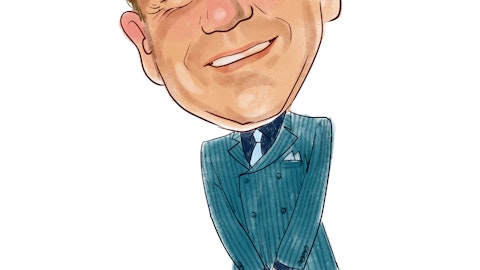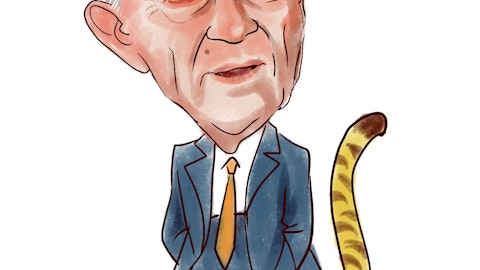Let Warren Buffett, David Einhorn, George Soros, and David Tepper WORK FOR YOU. If you want to beat the low cost index funds by an average of 6 percentage points per year look no further than Warren Buffett’s stock picks. That’s the margin Buffett’s stock picks outperformed the market since 2008. In this free report, Insider Monkey’s market beating research team identified 7 stocks Warren Buffett and 12 other billionaires are crazy about. The details are below.
Think you’re a better investor than Buffett? Most investors do. That’s why they invest in index funds or try to actively pick large-cap stocks. Don’t make the same mistake. Three decades ago Buffett published an article titled “The Superinvestors of Graham-and-Doddsville” in a Columbia Business School magazine. The article was challenging Eugene Fama’s “efficient markets” hypothesis, telling investors that superinvestors who have been investing in various value stocks have been outperforming the market by large margins. Eight years later Fama confirmed Buffett’s statements in an academic research paper by revising his “efficient markets” hypothesis. Well, Eugene Fama received the Nobel Prize in economics in 2013 for his studies on efficient markets whereas Warren Buffett became one of the richest man on the face of the earth by generating abnormal returns in “efficient markets”.
Another finance icon, John Bogle, turned The Vanguard Group into a mutual fund powerhouse by creating and promoting index funds and passive investing. I understand that you may not have known Warren Buffett 25 years ago but everybody in the finance world knew Buffett 15 years ago. Do you think it was a good idea to invest in an S&P 500 index fund or imitate Buffett’s stock picks in 1999? We already know that Buffett has been killing it before 1999 but “efficient markets” may have eliminated Buffett’s edge in investing by 1999.
Insider Monkey compiled the historical 13F filings of Berkshire Hathaway as well as more than 1100 hedge funds. 13F filings are quarterly filings where hedge funds and financial institutions reveal their portfolio of publicly traded stocks once a quarter. They have 45 days to disclose their end of quarter positions, so some people argue that these filings aren’t “timely”. Well, in our analysis we used even a longer 2-month delay to imitate Warren Buffett’s 13F portfolio.
Our analysis showed that Buffett’s 13F portfolio returned 0.55% per month between 1999 and 2012. That’s 20 basis points higher than the market’s 0.35% average monthly return during the same period. So, Warren Buffett was able to outperform the market by 2.4 percentage points per year. It may sound small but 2.4 percentage points additional return for a $100 billion portfolio means an additional $2.4 billion per year. Buffett tells ordinary investors to stay away from active money managers and invest in index funds. However, he himself doesn’t invest in index funds for the simple reason that his picks, however large they may be, outperform the market by a decent margin.
But wait! Warren Buffett invests large sums of money in stocks like Coca-Cola (KO) and Wells Fargo (WFC) -which is one of the biggest banks in the World– because he literally has tons of money to invest and he can only invest them in the largest stocks. Actually he thinks he can generate much higher returns if he were managing a much smaller portfolio. “I think I could make you 50% a year on $1 million. No, I know I could. I guarantee that,” Buffett said in a 1999 interview. So, instead of doing an exact imitation of Buffett’s portfolio, we can give equal weights to each stock that is in Buffett’s portfolio. This way smaller-cap stocks will be able to contribute more to our overall returns. Buffett’s equal weighted 13F portfolio returned 0.89% between 1999 and 2012. You read that right. Buffett’s equal weighted portfolio outperformed the market by an average of 0.54 percentage points per month between 1999 and 2012. If you had invested in a similar portfolio between 1999 and 2012 you would have outperformed the market by an average of 6.7 PERCENTAGE POINTS PER YEAR.
Do you still think you are a better investor than Warren Buffett? Let me give you one more result from our research before you answer this question. You may be thinking that Buffett’s stock picking ability may have been declining as he is getting older or as more investors imitate his style of investing. You would be wrong. Warren Buffett’s equal weighted portfolio returned 0.78% between 2008 and 2012, vs. 0.29% gain for the market. Buffett was able to outperform the market by an average of 6 percentage points per year more recently. Index investors would have generated much higher returns if they had simply imitated Buffett’s stock picks.
There were 46 stocks in Warren Buffett’s latest 13F portfolio. It may be very expensive to buy 46 stocks even when you are paying $9.99 per trade on TD Ameritrade. That’s why we are going to narrow down this list to 7 stocks by ranking Buffett’s picks based on their popularity among 60+ other billionaire investors who also disclose their holdings quarterly. We are basically asking 60+ other billionaires whether they would bet at least $10 million on any of Buffett’s 46 stock picks. Here are the 7 stocks Warren Buffett and other billionaires are crazy about:
1. Mastercard (MA): In addition to Warren Buffett, there were 17 other billionaires who bet at least $10 million on Mastercard. Stephen Mandel had $864 million invested in the stock at the end of June. Andreas Halvorsen also had a huge position of $721 million in the stock. Buffett’s position was close to $300 million. Mastercard isn’t a new investment idea. Three years ago Julian Robertson presented his bullish thesis on Mastercard and Visa in a CNBC interview (you can watch it here). Robertson said that these stocks aren’t exposed to credit risk and they will continue to grow at 20+% rates in the foreseeable future. He thinks these two stocks are more like technology stocks rather than financial services stocks. He was right. Mastercard tripled over the last 3 years. Mastercard management still thinks they will be able to grow their EPS at an annual rate of 20% at the very least. Berkshire is holding on to Mastercard because it is a stock with large sustainable moat and should continue to grow at decent rates.
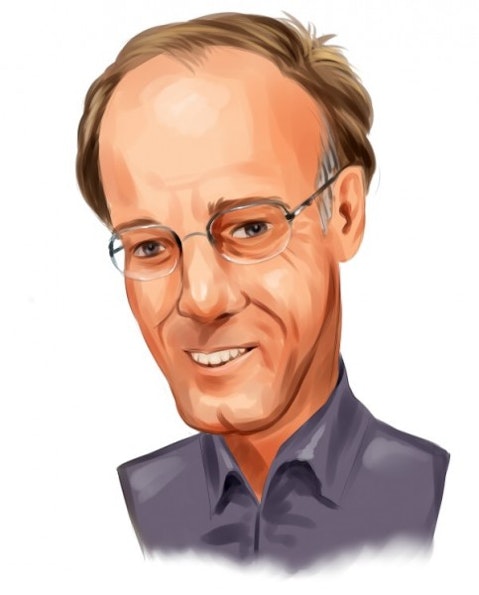
2. Liberty Global (LBTYK): Warren Buffett had more than $300 million in the C shares of Liberty Global. Stephen Mandel, Chase Coleman, John Griffin, and Dan Loeb are among other billionaires betting on this stock (you can see their entire portfolios by clicking on each billionaires name). Interestingly Bill Gates’ foundation and George Soros also had a position in the stock. In the July 2013 issue of our monthly newsletter we talked to Twin Capital’s David Simon and here is what he said about Liberty Global:
We’re fans of Liberty Global. It’s incorporated in London and trades here. They just acquired Virgin Media. The negative news today was that they made a bid for a German cable company while they were supposed to do a $3.5 million share buyback. We think John Malone’s philosophy is “Buy as much as you can now because interest rates are so cheap, then lock in your rates and own as much as you can,” because he’s very good with taxes and everything. The acquisition of Virgin Media increases the free cash flow of Liberty Global to the tune of 12% to 15% a year for at least 4-5 years, which is amazing.
Malone should pay down debt or whatever he wants and if he buys this other German cable company, he’ll control basically almost all of Germany because it’s contiguous to his other German companies. It’s the biggest cable operator in Europe and Europe’s growth rate in cable is probably over double what it is here. Attrition rates are much lower and telephony penetration is much lower. So, there’s more opportunity there.

3. DirecTV (DTV): Warren Buffett had nearly $2 billion in the stock and he profited handsomely as the stock is now being acquired by AT&T (T). John Paulson initiated a $850 million position in the stock probably as part of a merger arbitrage bet. Warren Buffett started buying DirecTV in the middle of 2011 when the stock was trading below $50. Buffett didn’t explain why he was buying the stock but another billionaire, Mason Hawkins, explained why he was bullish on the stock around the same time in his investor letter:
“Based in El Segundo, DIRECTV is the largest satellite broadcaster in the U.S. and has dominant market share in Latin America. Domestically the company offers unique technology and programming that attract high-end customers with little churn. In Latin America, most countries have no alternative because neither cable nor fiber have been
or will be laid where there is minimal infrastructure. The market puts a low growth multiple on the entire earnings stream, not accounting for the more valuable emerging
market growth. Additionally, SAC (subscriber acquisition cost) is counted against earnings rather than being treated as discretionary capex that provides a return via revenues over multiple years. The stock trades below 70% of our appraisal, and Mike White has done a tremendous job building value by using the substantial cash coupon to buy in shares aggressively at deeply discounted levels. The free cash flow yield based on 2012 expected FCF is 10.3%.”
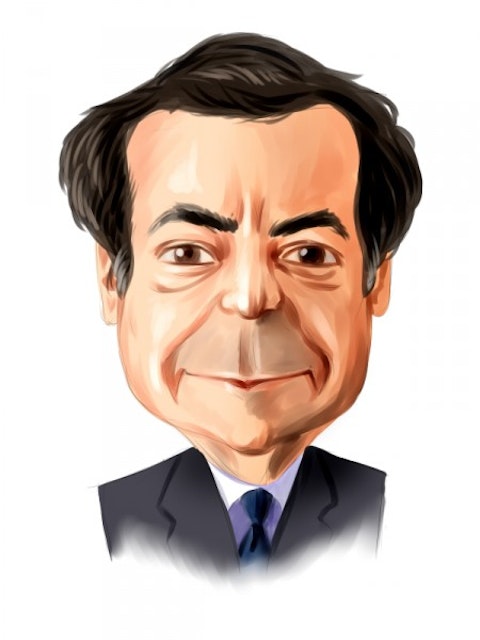
4. General Motors (GM): Warren Buffett had $1.2 billion in GM at the end of June. Billionaires David Tepper, Larry Robbins, and George Soros also had large bets on the stock. Activist Barry Rosenstein and David Einhorn had large positions in the stock earlier this year but they sold out their holdings as the company was troubled with multiple recalls. Two years ago Einhorn explained his GM thesis as follows in his investor letter:
“In expanding on our GM thesis, we argued that the company has not been given credit for its improved competitive and financial position post-bankruptcy. At $24.75 per share, GM trades at 8x this year’s earnings of about $3 per share. GM is poised to benefit from continued recovery in the U.S. market, a significant product upgrade cycle, eventual restructuring in Europe, and continued growth in China and Brazil. We view the government stake as an opportunity, rather than an overhang.”
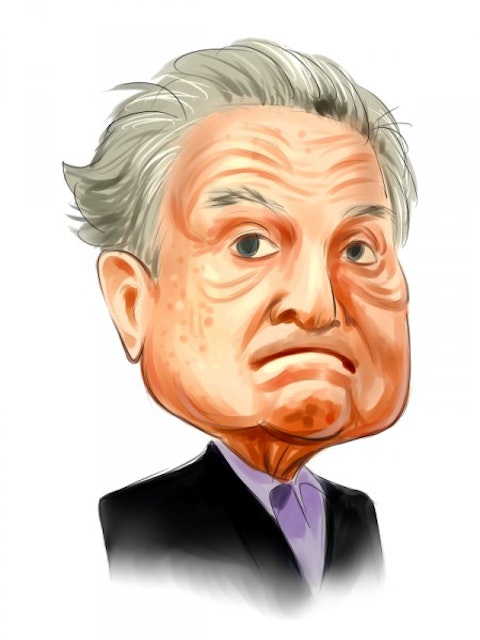
5. 2. Liberty Global (LBTYA): Buffett had another $436 million invested in Liberty Global, but this time through its A shares. Stephen Mandel, David Einhorn, and Larry Robbins are also betting on this stock. Credit Suisse has a $50 price target on LBTYA on the assumption that Liberty GLobal is a large-cap EBITDA growth story. Here is what the said in their August 2014 report:
“LBTY has usd2.6bn of the current buyback programme remaining to do to end 2015 (on hold during the Ziggo offer period). Meanwhile LBTY leverage is falling due to rising EBITDA and we forecast will continue to on EBITDA growth and with Ziggo consideration being two thirds LBTY shares. So there would seem plenty of scope for the buyback programme to continue beyond 2015 (we assume usd1.5bn pa vs FCF of usd2bn+).
On these assumptions, LBTY EV/EBITDA falls to 7.6x in 2015E and 6.9x in 2016E, a discount to its peers and some European telcos as well. FCF yield rises to 9.4% in 2015E (the upper end of European telco valuations) and 11.6% by 2016E (above the upper end of the European telco range). We raise our target price to usd50 a share, which would leave LBTY on 7.6x 2016E EV/EBITDA and a 2016E equity FCF yield of 9.5%.”
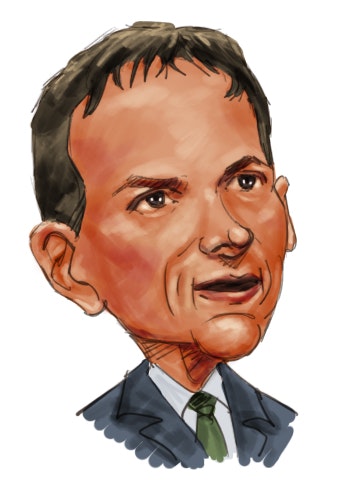
6. Visa (V): This bet is very similar to the Mastercard bet. Buffett had nearly $400 million invested in the stock at the end of June. Andreas Halvorsen, Ken Griffin, and Israel Englander have also been betting on the stock. Visa is growing at a slightly slower rate than Mastercard. That’s why the stock is trading at 21 times CY2015 earnings.
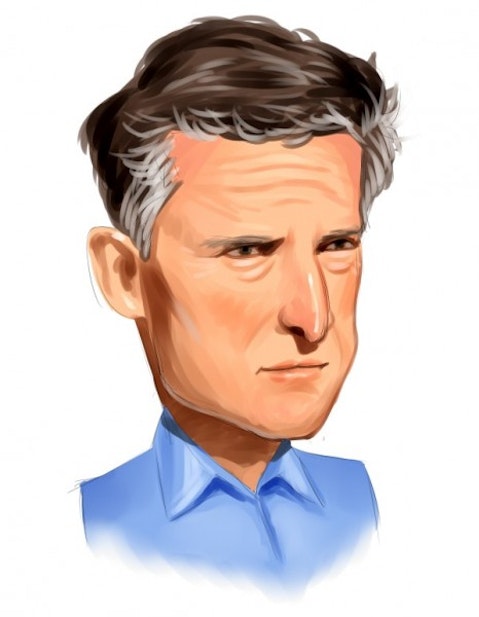
7. Mondelez (MDLZ): Buffett has a very small position in the stock. He is probably waiting for a much better price to boost his holdings. Activist Nelson Peltz is the largest holder with a $1.5 billion position. Mason Hawkins also has nearly $1.2 billion invested in this stock. Mario Gabelli, Jim Simons, and James Dinan are among Mondelez shareholders too. Mondelez is another stock that’s growing its earnings by around 10-15% annually and trade at 20 times 2015 earnings. S&P said the following about the stock in a research note:
“The company agreed to form a coffee joint venture in May 2014 with D.E. Master Blenders 1753 B.V., taking a 49% interest in the new company in return for $5 billion (after-taxes) in cash. The transaction is pending customary closing conditions, including regulatory approval, and is expected to close in 2015. Also, MDLZ received an after-tax award in December 2013 of roughly $2.8 billion pretax relating to a dispute involving Starbucks packaged coffee.We expect a majority of funds received from these transactions to fund share repurchases.
Over time, we think rising incomes and changing lifestyles in developing markets, plus improving distribution channels, will help fuel growth for Mondelez. The company expects to grow revenues at or above the growth levels of the categories in which it operates over the long term. However, reported sales growth may be restrained by strength of the U.S. dollar relative to other currencies. Additionally, the company is targeting $3 billion in gross productivity savings between 2014 and 2017, which we expect to help drive margin expansion.”
Note: Buffett’s large cap stock picks outperformed the market but there is a better way of investing. Our research has shown that hedge funds are very talented at picking small-cap picks. The top 15 small cap stocks among hedge funds outperformed the markey by 18 percentage points per year between 1999 and 2009. We have been sharing the list of top small cap picks in our quarterly newsletter since the end of August 2012. Our stock picks returned 100.4% through the end of August 2014 and outperformed the market by more than 52 percentage points. You can check out the details on this page.




